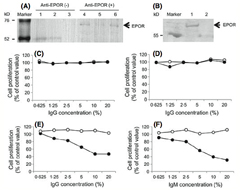- Home
- Highlights
- Anti-glycoprotein receptor antibody is newly detected in patients with anaemia
Highlights
Anti-glycoprotein receptor antibody is newly detected in patients with anaemia
Erythropoietin is a glycoprotein that regulates red cell production. Deficiencies in erythropoietin can lead to various types of anaemia. Now studies reported by Takashi Wada and colleagues in Kanazawa indicate that anti-erythropoietin receptor (anti-EPOR) antibodies play a functional role in the pathogenesis of anaemia.
Eythropoietin stimulates erythroid progenitor cells in the bone marrow. Previous research had shown that sera from patients with a certain type of anaemia contain antibodies that are selectively cytotoxic to bone marrow erythroid cells. These are termed autoantibodies because they target the individual’s own proteins. The Kanazawa researchers hypothesised that anaemic patients with immune-mediated diseases have autoantibodies that interfere with the interaction between erythropoietin and its receptor.
The researchers tested blood samples from 203 patients between the ages of 7 and 87. Among the patients tested 128 had various rheumatological diseases and other autoimmune conditions, 35 were anaemic with chronic kidney disease and 40 were healthy individuals considered as a control group.
The researchers used enzyme-linked immunosorbent assays (ELISAs) to test for the presence of serum anti-EPOR antibodies. For certain diseases in the study, a number of samples were found to have anti-EPOR antibodies present. In particular, samples from patients with severe anaemia had a significantly higher probability of having anti-EPOR antibodies present, whereas none was found among the controls.
Monitoring the biological activity of the antibodies revealed that immunoglobin samples with anti-EPOR antibodies had a negative impact on EPO-mediated cell growth. In addition clinical characteristics of systemic lupus erythematosus — the rheumatological disease affecting the largest group among the patients tested — were increased in patients with anti-EPOR antibodies.
Despite certain limitations of the study, as the authors point out, “These results suggest that some anti-EPOR antibodies interfere with the differentiation of erythroid progenitor cells in bone marrow, leading to anaemia with erythroid hypoplasia.”
Publication and Affiliation
Akinori Hara1,2, Kengo Furuichi1,2, Masato Higuchi3, Yasunori Iwata1,4, Norihiko Sakai1,2, Shuichi Kaneko2 and Takashi Wada1,4* Autoantibodies to erythropoietin receptor in patients with immune-mediated diseases: relationship to anaemia with erythroid hypoplasia. British Journal of Haematology, (2012) doi: doi:10.1111/bjh.12105. Link
1. Division of Nephrology, Kanazawa University Hospital, Kanazawa, Ishikawa, Japan
2. Department of Disease Control and Homeostasis, Faculty of Medicine, Institute of Medical, Pharmaceutical and Health Sciences,Kanazawa University, Kanazawa, Ishikawa, Japan
3. Medical Research Institute, Kanazawa Medical University, Kanazawa, Ishikawa, Japan
4. Department of Laboratory Medicine, Faculty of Medicine, Institute of Medical, Pharmaceutical and Health Sciences, Kanazawa University, Kanazawa, Ishikawa, Japan
*corresponding author, e-mail address: twada@m-kanazawa.jp
ID: 201212B012

